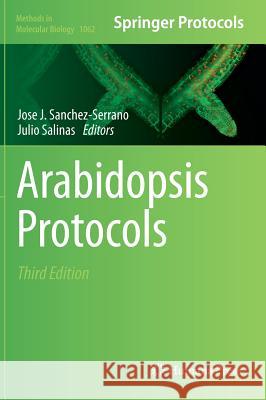Arabidopsis Protocols » książka



Arabidopsis Protocols
ISBN-13: 9781627035798 / Angielski / Twarda / 2013 / 726 str.
Arabidopsis Protocols
ISBN-13: 9781627035798 / Angielski / Twarda / 2013 / 726 str.
(netto: 766,76 VAT: 5%)
Najniższa cena z 30 dni: 771,08
ok. 16-18 dni roboczych.
Darmowa dostawa!
This book features cutting-edge methods and protocols, each offering step-by-step laboratory instructions, an introduction outlining the principles behind the technique and tips on troubleshooting and avoiding known pitfalls.
Part I. Growing Arabidopsis
1. Handling Arabidopsis Plants: Growth, Preservation of Seeds, Transformation and Genetic Crosses
Luz Rivero, Randy Scholl, Nicholas Holomuzki, Deborah Crist, Erich Grotewold, and Jelena Brkljacic
2. Using Arabidopsis Related Model Species (ARMS): Growth, Genetic Transformation and Comparative Genomics
Giorgia Batelli, Dong-Ha Oh, Matilde Paino D’Urzo, Francesco Orsini, Maheshi Dassanayake, Jian-Kang Zhu, Hans J. Bohnert, Ray A. Bressan and Albino Maggio
3. Growing Arabidopsis in vitro: Cell Suspensions, in vitro Culture, and Regeneration
Bronwyn J. Barkla, Rosario Vera-Estrella, and Omar Pantoja
Part II. Arabidopsis resources
4. Arabidopsis Database and Stock Resources
Donghui Li, Kate Dreher, Emma Knee, Jelena Brkljacic, Erich Grotewold, Tanya Z. Berardini, Philippe Lamesch, Margarita Garcia-Hernandez, Leonore Reiser and Eva Huala
5. Bioinformatic Tools in Arabidopsis Research
Miguel de Lucas, Nicholas J. Provart, and Siobhan Brady
Part III. Genetic techniques
6. Exploiting Natural Variation in Arabidopsis
Johanna A. Molenaar and Joost J. B. Keurentjes
7. Grafting in Arabidopsis
Katherine Bainbridge, Tom Bennett, Peter Crisp, Ottoline Leyser, and Colin Turnbull
8. Agrobacterium tumefaciens Mediated Transient Transformation of Arabidopsis thaliana Leaves
Silvina Mangano, Cintia Daniela González, and Silvana Petruccelli
9. iTilling: Personalized Mutation Screen
Susan M. Bush and Patrick J. Krysan
10. Tailor Made Mutations in Arabidopsis Using Zinc-Finger Nucleases
Yiping Qi, Colby G. Starker, Feng Zhang, Nicholas J. Baltes, and Daniel F. Voytas
11. The Use of Artificial Micro RNA Technology to Control Gene Expression in Arabidopsis thaliana
Andrew L. Eamens, Marcus McHale, and Peter M. Waterhouse
12. Generation and Identification of Arabidopsis EMS Mutants
Li-Jia Qu and Gengi Qin
13. Generation and Identification of Arabidopsis T-DNA Insertion Mutants
Li-Jia Qu and Gengi Qin
14. Identification of EMS-induced Causal Mutations in Arabidopsis thaliana by Next-Generation Sequencing
Naoyuki Uchida, Tomoaki Sakamoto, Masao Tasaka, and Tetsuya Kurata
15. Arabidopsis Transformation with Large Bacterial Artificial Chromosomes
Jose M. Alonso and Anna N. Stepanova
16. Global DNA Methylation Analysis Using Methyl-Sensitive Amplification Polymorphism (MSAP)
Mahmoud W. Yaish, Mingsheng Peng, and Steven J. Rothstein
Part IV. Molecular biological techniques
17. Next Generation Mapping of Genetic Mutations Using Bulk Population Sequencing
Ryan S. Austin, Steven P. Chatfield, Darrell Desveaux, and David S. Guttman
18. Chemical Fingerprinting of Arabidopsis Using Fourier-transform Infrared (FT-IR) Spectroscopic Approaches
András Gorzsás and Björn Sundberg
19. A Pipeline for 15N Metabolic Labeling and Phosphoproteome Analysis in Arabidopsis thaliana
Benjamin B. Minkoff, Heather L. Burch, and Michael R. Sussman
20. Gene Expression Profiling Using DNA Microarrays
Kionoshin Maruyama, Kazuko Yamaguchi-Shinozaki, and Kazuo Shinozaki
21. Forward Chemical Genetic Screening
Hyunmo Choi, Jun-Young Kim, Young Tae Chang, and Hong Gil Nam
22. Highly-Reproducible ChIP-On-Chip Analysis to Identify Genome-Wide Protein Binding and Chromatin Status in Arabidopsis thaliana
Jong-Myong Kim, Taiko Kim To, Maho Tanaka, Takaho A. Endo, Akihiro Matsui, Junko Ishida, Fiona C. Robertson, Tetsuro Toyoda, and Motoaki Seki
Part V. Cell biological techniques
23. Fluorescence Microscopy
Sebastien Peter, Klaus Harter, and Frank Schleifenbaum
24. Immunocytochemical Fluorescent In Situ Visualization of Proteins in Arabidopsis
Yohann Boutté and Markus Grebe
25. High Pressure Freezing and Freeze Substitution of Arabidopsis For Electron Microscopy
Jotham R. Austin, II.
26. Applications of Fluorescent Marker Proteins in Plant Cell Biology
Michael R. Blatt and Christopher Grefen
27. Flow Cytometry and Sorting in Arabidopsis
David W. Galbraith
28. Live Imaging of Arabidopsis Development
Daniel von Wangenheim, Gabor Daum, Jan U. Lohmann , Ernst K. Stelzer, and Alexis Maizel
29. Arabidopsis Organelle Isolation and Characterisation
Nicolas L. Taylor, Elke Ströher, and A. Harvey Millar
Part VI. Biochemical and physiological techniques
30. Analysis of Subcellular Metabolite Distributions within Arabidopsis thaliana Leaf Tissue: A Primer for Subcellular Metabolomics
Stephan Krueger, Dirk Steinhauser, Jan Lisec, and Patrick Giavalisco
31. Hormone Profiling
Gaetan Glauser, Armelle Vallat, and Dirk Balmer
32. Purification of Protein Complexes and Characterization of Protein-Protein Interactions
Kirby N. Swatek, Chris B. Lee, and Jay J. Thelen
33. Protein Fragment Bimolecular Fluorescence Complementation Analysis for the In vivo Study of Protein-Protein Interactions and Cellular Protein Complex Localizations
Rainer Waadt, Kathrin Schlükling, Julian I. Schroeder, and Jörg Kudla
34. The Split Ubiquitin System for the Analysis of Three-Component Interactions
Christopher Grefen
35. RNA-Binding Protein Immunoprecipitation from Whole Cell Extracts
Tino Köster and Dorothee Staiger
36. High Throughput Analysis of Protein-DNA Binding Affinity
José M. Franco-Zorrilla and Roberto Solano
Arabidopsis Protocols, Third Edition compiles some of the most recent methodologies developed to exploit the Arabidopsis genome. These methodologies cover from the guided access to public resources, to genetic, cell biology, biochemical and physiological techniques, including both those that are widely used as well as those novel techniques likely to open up new avenues of knowledge in the future. In addition, considering the recent unparalleled progress of the “omics” tools in Arabidopsis, leading experts have contributed sections on genome, transcriptome, proteome, metabolome and other whole-system approaches. Arabidopsis thaliana is acknowledged as the most important plant model system by the scientific community and Arabidopsis research has fundamentally influenced our understanding of the basic biology and ecology of plants. Written in the successful Methods in Molecular Biology series format, chapters include introductions to their respective topics, lists of the necessary materials and reagents, step-by-step, readily reproducible protocols, and notes on troubleshooting and avoiding known pitfalls.
Authoritative and easily accessible, Arabidopsis Protocols, Third Edition seeks to serve both experienced researchers and beginners with its detailed methodologies on this burgeoning scientific field.
1997-2026 DolnySlask.com Agencja Internetowa
KrainaKsiazek.PL - Księgarnia Internetowa









